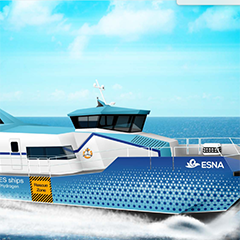Developing zero emission small ships
There is a green revolution in ship technology going on these days. We are currently witnessing a wave of zero emission propulsion ideas entering the market like battery powered car ferries for short routes, power shaving batteries onboard offshore hybrid service vessels and cruise liners that can enter protected fjords purely on batteries. Such efforts are fine for the local environment, but will hardly contribute significantly to bring down the CO2 emission of the global shipping fleet by 50% within 2050 as is the goal of the International Maritime Organisation (IMO).
There is a strong push from the public as well as governments, industries and NGOs in support of the UN’s sustainable goals to counter the threats to our planet caused by the global warming.
This development is just in the beginning and is strongly supported by class societies and maritime administrations such as DNV GL, Lloyds Register, Bureau Veritas, Korean Register, Royal Society etc. Serious discussions and development work are taking place pointing to the opportunity of changing the future fuel from fossil fuels, typically characterized as hydrocarbon chemical compounds of CyHx, to hydrogen rich compounds without carbon.
Developing zero emission small ships
There is a green revolution in ship technology going on these days. We are currently witnessing a wave of zero emission propulsion ideas entering the market like battery powered car ferries for short routes, power shaving batteries onboard offshore hybrid service vessels and cruise liners that can enter protected fjords purely on batteries. Such efforts are fine for the local environment, but will hardly contribute significantly to bring down the CO2 emission of the global shipping fleet by 50% within 2050 as is the goal of the International Maritime Organisation (IMO).
There is a strong push from the public as well as governments, industries and NGOs in support of the UN’s sustainable goals to counter the threats to our planet caused by the global warming.
This development is just in the beginning and is strongly supported by class societies and maritime administrations such as DNV GL, Lloyds Register, Bureau Veritas, Korean Register, Royal Society etc. Serious discussions and development work are taking place pointing to the opportunity of changing the future fuel from fossil fuels, typically characterized as hydrocarbon chemical compounds of CyHx, to hydrogen rich compounds without carbon.
To read the full content,
please download the PDF below.















